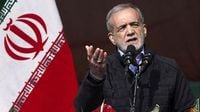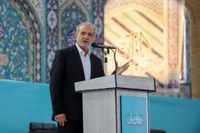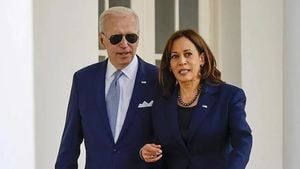Tempers are flaring once again between Iran and Israel, but this time, the battleground isn’t military—it’s water. On August 12, 2025, Israeli Prime Minister Benjamin Netanyahu released a video message addressed directly to the Iranian people, pledging that Israel would help solve Iran’s severe water shortage crisis—if, and only if, Iran becomes “free” from its current government. The offer, which Israeli media quickly picked up, was anything but a routine diplomatic gesture. Instead, it has sparked a heated exchange, laying bare the deep-rooted mistrust and political tensions that continue to define the relationship between the two countries.
The Iranian response was swift and biting. President Masoud Pezeshkian, who has been dealing with the realities of a nation parched by drought and years of water mismanagement, did not mince words. Posting on X (formerly Twitter) on August 13, Pezeshkian wrote, “A regime that deprives people of Gaza of water and food says it will bring water to Iran? A mirage, nothing more.” He doubled down during a cabinet meeting in Tehran, accusing Netanyahu and others of “falsely claiming compassion for the people of Iran.” According to Pezeshkian, “those with a deceptive appearance are falsely claiming compassion for the people of Iran,” and he urged, “First, look at the difficult situation of Gaza and defenceless people, especially children who are struggling ... because of hunger, lack of access to potable water and medicine, and because of a siege by the brutal regime.” (as reported by News18 and other outlets).
This sharp rebuke wasn’t just a one-off. It echoed a pattern of political sparring that has intensified since June 2025, when Israel launched a series of airstrikes on Iran, targeting nuclear facilities, top military commanders, and nuclear scientists. According to multiple reports, these strikes resulted in nearly 1,100 Iranian deaths, including many military leaders. Iran retaliated with its own strikes, which killed 28 people in Israel. The scars from those attacks are still fresh, and they color every interaction—no matter how seemingly humanitarian—between the two governments.
Netanyahu’s offer, therefore, didn’t land as an olive branch in Tehran. Instead, it was seen as a provocation, or at best, a public relations move. President Pezeshkian’s reaction made clear that, in his eyes, any Israeli promise to help with water is undermined by ongoing Israeli policies in Gaza. The Iranian leader’s skepticism is rooted in what he describes as a contradiction: “A regime that deprives people of Gaza of water and food says it will bring water to Iran? A mirage, nothing more.”
But beyond the political rhetoric, Iran is facing a very real and worsening water crisis. On August 13, as temperatures in Tehran soared above 40 degrees Celsius, authorities ordered government offices and banks to close across much of the country. This was the second such closure of the summer, according to state television and international media. The closures were a direct response to the twin pressures of surging summer heat and the strain on the country’s already fragile power grid.
Iran’s electricity production, which peaks at around 62,000 megawatts per hour, falls far short of the 80,000 megawatts experts say are needed to meet demand. As a result, rolling blackouts have become the norm in Tehran and other major cities, with two-hour outages every other day now threatening to stretch to four hours as the crisis deepens. Authorities have urged residents to avoid outdoor activities during the hottest hours and to conserve both water and energy wherever possible.
President Pezeshkian has been candid about the scale of the crisis. On August 10, in a meeting with officials, he reportedly lamented, “We do not have water; we do not have water under our feet and we do not have water behind our dams, so you tell me, what do we do? Someone comes and tells me, ‘What do I have to do?’” He described the situation as “a serious and unimaginable crisis” and assured that his administration is in touch with experts to try to find solutions. The president’s public statements reflect a sense of urgency—and perhaps even desperation—as Iran confronts a water shortage that experts attribute to both years of drought and chronic water mismanagement.
According to analysts cited by News18 and other international media, the roots of Iran’s water crisis run deep. Years of below-average rainfall, compounded by inefficient agricultural practices, outdated infrastructure, and poor planning, have left the country’s reservoirs depleted. Many of Iran’s dams, once symbols of national progress, now sit half-empty or worse. The government’s efforts to manage the crisis have included rationing, public awareness campaigns, and attempts to modernize irrigation systems, but these measures have so far failed to stem the tide.
For ordinary Iranians, the crisis is more than just a political talking point. Daily life has been upended by water shortages, power outages, and the constant threat of even more severe disruptions. The closure of government offices and banks is just one visible sign of a system under immense stress. For those living in Tehran and other affected cities, the prospect of four-hour blackouts amid extreme heat is a daunting one.
Meanwhile, the diplomatic spat with Israel has added another layer of complexity. While Netanyahu’s offer may have been intended to signal goodwill—or at least to highlight the failures of Iran’s current government—it has instead reinforced existing hostilities. President Pezeshkian’s response, laced with references to Gaza and accusations of hypocrisy, reflects a broader narrative in which humanitarian issues are inseparable from the region’s political disputes.
It’s not just Iran and Israel watching these developments. The international community, too, is paying close attention. Germany’s recent approval of a submarine for Israel and the United Kingdom’s imposition of new nuclear sanctions on Iran, as reported by News18, are reminders that the stakes in this region remain high. Water, power, and politics are deeply intertwined, and every gesture—no matter how well-intentioned—can quickly become a flashpoint.
As Iran’s government scrambles to find solutions, and as the rhetoric between Tehran and Jerusalem grows sharper, one thing is certain: the country’s water crisis is not going away anytime soon. For now, President Pezeshkian and his administration remain focused on the immediate task at hand—finding water where there is little to be found, and keeping the lights on in a nation where the heat, quite literally, is rising.






